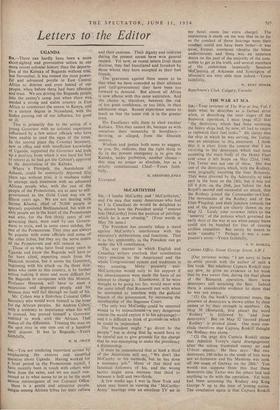Sta,—You are rendering important service by emphasising the anxious and
unsettled question about Uganda. Having worked for a brief period in the Protectorate myself, I have recently been in touch with others who have done the same, and we are much con- cerned as to what seems to us to be the most Unwise intransigence of our Colonial Office. Here is a gentle and attractive people, Unique among African tribes for their culture and their customs. Their dignity and restraint during the present unrest have won general respect. Yet now, as recent letters from them disclose, they feel humiliated and forsaken by those whom they have accepted as their best friends.
The gravamen against them seems to be that what we have conceded as their ultimate goal (self-government) they have been too forward to demand. But almost all Africa is now aflame with this same aspiration. And the choice is, therefore, between the- risk of too great confidence, or too little, in their adolescent stage. Recent experience seems to teach us that the lesser risk is in the greater trust.
His Excellency tells them to elect another Kabaka. This they cannot do, because as with ourselves their monarchy is hereditary— deriving, as alleged, from the fifteenth century.
Wisdom and justice both seem to suggest, as you, Sir, indicate, that the right thing to do in the present emergency is to give the Kabaka, under probation, another chance— this time no longer as absolute, but as a strictly constitutional Chief—Yours faith- fully, Liverpool
H. ORESFORD,JONES


































 Previous page
Previous page